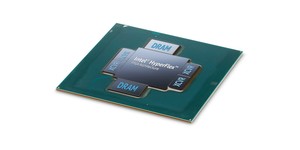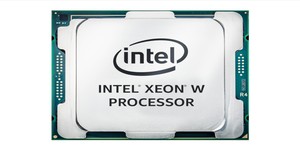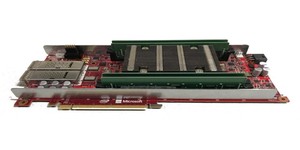Intel has announced that the first of its chips to feature field-programmable gate array (FPGA) hardware will be hitting servers in the first quarter of 2016, in limited quantities.
An FPGA is a middle-ground between a general-purpose processor which may not be terribly efficient at any given task and an application-specific integrated circuit (ASIC) which is extremely efficient at one particular task but cannot do anything else. Frequently used to test designs prior to building an ASIC and popular for accelerating particular workloads, FPGAs are typically dedicated chips - though versions embedded into system-on-chip (SoC) designs, typically using ARM CPU cores, are popular in embedded development. Unlike an ASIC, which is fixed at the point of manufacturing, an FPGA can be reprogrammed at any time: today it's accelerating SHA-512 hashing, tomorrow it's acting as an Ethernet MAC.
It's this flexibility which convinced Intel to integrate FPGAs with selected processors, starting with its Xeon family, and it's a project the company is putting serious money behind: back in June it acquired FPGA specialist Altera in a $16.7 billion deal. Now, that acquisition is bearing fruit with the announcement that the first FPGA-equipped Xeon parts are to roll off the production line early next year.
According to Intel's Diane Bryant, speaking at the Structure conference attended by IDG, the first FPGA Xeon will be shipped to selected customers - the largest cloud service providers, Bryant explained - in the first quarter of 2016. This, however, does not represent general availability: the units shipped will be for the company's biggest customers to 'begin tuning their algorithms' ahead of a proper roll-out at an undetermined future date, Bryant claimed.
Typically, features found in the company's Xeon chips eventually trickle down to its mainstream Core processor family. When this might happen with Altera's FPGA technology, though, remains to be seen: while having FPGA hardware could be of benefit to desktop users, the overwhelming majority will lack the knowledge to make use of it directly - meaning it would be up to either hardware companies or software developers to find a way to make use of the FPGA outside the data centre.
Pricing and specifications for the FPGA Xeon range has not yet been confirmed.
An FPGA is a middle-ground between a general-purpose processor which may not be terribly efficient at any given task and an application-specific integrated circuit (ASIC) which is extremely efficient at one particular task but cannot do anything else. Frequently used to test designs prior to building an ASIC and popular for accelerating particular workloads, FPGAs are typically dedicated chips - though versions embedded into system-on-chip (SoC) designs, typically using ARM CPU cores, are popular in embedded development. Unlike an ASIC, which is fixed at the point of manufacturing, an FPGA can be reprogrammed at any time: today it's accelerating SHA-512 hashing, tomorrow it's acting as an Ethernet MAC.
It's this flexibility which convinced Intel to integrate FPGAs with selected processors, starting with its Xeon family, and it's a project the company is putting serious money behind: back in June it acquired FPGA specialist Altera in a $16.7 billion deal. Now, that acquisition is bearing fruit with the announcement that the first FPGA-equipped Xeon parts are to roll off the production line early next year.
According to Intel's Diane Bryant, speaking at the Structure conference attended by IDG, the first FPGA Xeon will be shipped to selected customers - the largest cloud service providers, Bryant explained - in the first quarter of 2016. This, however, does not represent general availability: the units shipped will be for the company's biggest customers to 'begin tuning their algorithms' ahead of a proper roll-out at an undetermined future date, Bryant claimed.
Typically, features found in the company's Xeon chips eventually trickle down to its mainstream Core processor family. When this might happen with Altera's FPGA technology, though, remains to be seen: while having FPGA hardware could be of benefit to desktop users, the overwhelming majority will lack the knowledge to make use of it directly - meaning it would be up to either hardware companies or software developers to find a way to make use of the FPGA outside the data centre.
Pricing and specifications for the FPGA Xeon range has not yet been confirmed.

MSI MPG Velox 100R Chassis Review
October 14 2021 | 15:04









Want to comment? Please log in.